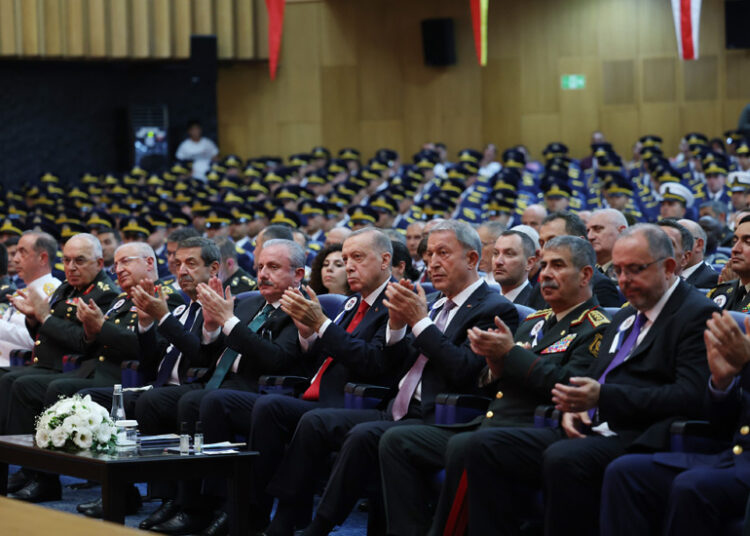Abdullah Bozkurt/Stockholm
The imperial ambitions and expansionist vision harbored by the Islamist-led government in Turkey have once again been revealed through remarks made by a senior official entrusted with training and promoting new officers in the Turkish army, the largest in NATO by manpower after the United States.
“Vienna has fallen 341 years later,” wrote Erhan Afyoncu, president of the state-owned National Defense University, on X on July 2, immediately after the Turkish football team secured a victory against Austria in the UEFA European Football Championship.
He was referring to the failed attempts by the Ottoman army in 1683 to capture Vienna, a critical trade hub and strategic city whose conquest would have enabled greater Turkish expansion into Europe. Afyoncu also honored the memory of Merzifonlu Kara Mustafa Pasha, the grand vizier who led the unsuccessful military campaign.
“May the souls of Merzifonlu Kara Mustafa Pasha, who gave his life for the Kızılelma [Red Apple] in front of Vienna, and all our martyrs be blessed,” he wrote.
In Turkish literature “Kızılelma” refers to a prophecy of conquering lands far beyond existing frontiers, achieving world domination through a pan-Turkic/Islamic movement, and the ambition to establish a global empire in a mythical hinterland.
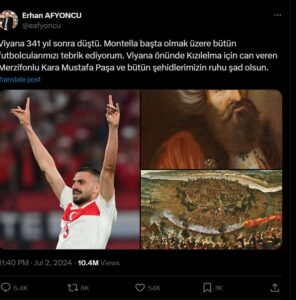
This expression is frequently used by Turkish President Recep Tayyip Erdogan and other senior government officials in their public speeches.
On August 26, 2020, the anniversary of the Battle of Manzikert, Erdogan recited a nationalist poem, stating, “The brave shed blood, the flag begins to fade, Anatolia starts to become a homeland [for Turks]. To [march towards] Kızılelma, hey, to Kızılelma.”
The battle marks the beginning of Turkish domination in Anatolia, then ruled by the Byzantine Empire. In 1071 the Seljuks, predecessors of the Ottomans, defeated the predominantly Greek forces of the Byzantine Empire, initiating the Turkification of Anatolia.
Erdogan posted his remarks on X, accompanied by a propaganda video. The video featured the Seljuk army’s Turkish soldiers battling on horseback with swords and arrows, juxtaposed with clips of modern warfare assets of the Turkish army and a photo of Erdogan holding a bow.
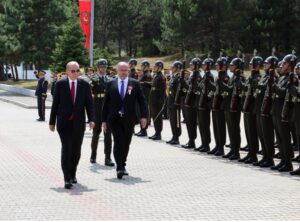
It is clear that Kızılelma represents the expansionist and irredentist ambitions of the new Turkey under Erdogan’s rule. In many public speeches Erdogan has asserted that Turkey cannot be confined to its current borders, stating that in his heart, Turkey’s real borders extend far beyond those of today.
For example, during a rally in the western province of İzmir on January 5, 2019, Erdogan declared that in his view, the true borders of Turkey’s western province of İzmir extend from Vienna to the Adriatic Sea, the northern Black Sea and Eastern Turkistan, including China’s Xinjiang Uyghur Autonomous Region.
This concept has been reinforced through various methods to embed it in the Turkish psyche. For instance, the government funded a popular TV series aired on the state-run TRT titled “Kızılelma,” which depicted the efforts of Turkish intelligence agency MIT to advance this utopian vision. Additionally, a new version of Bayraktar armed drones, manufactured by defense contractor Baykar and owned by President Erdogan’s son-in-law, has also been named Kızılelma.
In an article published in Sabah, a government mouthpiece owned by President Erdogan’s family, Afyoncu described Kızılelma as “the embodiment of the Turks’ desire and effort to dominate the entire world… Abandoning this ideal signifies the beginning of the Turkish nation’s decline.”
In another article written two days before the Turkish football team faced the Austrian team, Afyoncu described how Austrians have historically lived in fear of the Turks due to the military campaigns launched by the Ottoman army against Vienna.
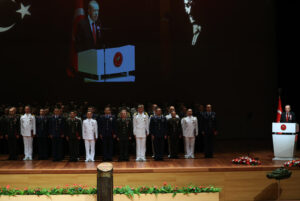
In many of his articles, Afyoncu revisits historical conflicts between the Turks and various NATO allies, asserting that the current issues between Erdogan’s government and the US, European powers, Russia, Egypt and Saudi Arabia are rooted in this legacy. He seeks to justify the government’s foreign policy missteps through his own revisionism, aiming to persuade the public to overlook the Erdogan administration’s shortcomings.
Afyoncu is not just any figure in Erdogan’s government. As a loyalist, he was personally selected by the president to head the National Defense University (Milli Savunma Üniversitesi), despite lacking a military background, which is unusual for someone overseeing a military institution.
The university was abruptly established in 2016 by the government to replace the war academies (Harp Akademileri), which had been training highly qualified officers for the Ottoman and Turkish armies since 1848. The National Defense University trains both commissioned and noncommissioned officers for the air force, navy and land forces and operates directly under the Ministry of Defense. The graduates have promising careers ahead, with the potential to advance quickly through the ranks to become generals and admirals.
Two of the four deputy presidents at the university also come from civilian backgrounds unrelated to military education or warfare strategies. Serdar Salman is an academic specializing in metallurgy, while Talat Canbolat is a lawyer with expertise in traffic regulation. The sole criterion for their selection appears to be unwavering allegiance to Erdogan’s political Islamist vision.
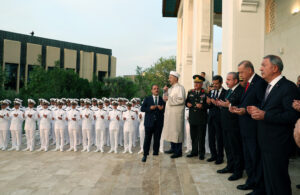
The university is part of Erdogan’s broader initiative to reshape the Turkish military into a force dedicated to protecting his regime and advancing his political objectives, which may not always align with Turkey’s national security interests.
Using a 2016 false flag coup attempt as a pretext, Erdogan purged nearly two-thirds of flag officers as well as 81 percent of all staff officers, who were crucial to the army’s operational and planning capabilities. In total 10,468 officers — about one-third of the entire officer corps — were removed from the Turkish military within a few months of the coup attempt.
The establishment of the National Defense University emerged in this vacuum as a special project aimed at cultivating a new generation of officers. This initiative focuses on aligning recruits with ideological affinities within Islamist, nationalist and neo-nationalist circles and ensuring their absolute conformity with Erdogan’s political Islamist regime.
The commission that reviews applicants for admission to the university was led by Afyoncu and included members from the Turkish paramilitary group SADAT, which stands for Uluslararası Savunma Danışmanlık İnşaat Sanayi ve Ticaret Anonim Şirket. SADAT has served as a military contractor supporting Erdogan’s projects in Syria, Libya and other regions.
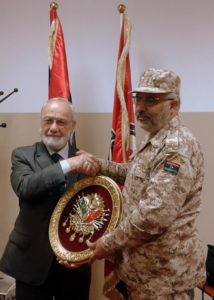
SADAT was founded by Erdogan’s former chief military advisor, retired General Adnan Tanrıverdi, who played a crucial role in advising the president on mass purges of officers and the appointment and promotion of new ones. Tanrıverdi, who views Erdogan as the long-awaited Mahdi — the prophesied redeemer of Islam —continues to support Erdogan, albeit unofficially. He is involved in advancing pan-Islamist policies, including the envisioned creation of a Muslim equivalent of the NATO alliance with the assistance of Iran and other Muslim countries.
The indoctrination of cadets at military institutions in line with Afyoncu’s neo-Ottomanist vision poses a significant challenge for Turkey’s allies and partners. Although Turkey remains a member of NATO, officers educated at the university are being instilled with the belief that Turkey’s allies harbor ill intentions toward their country and should therefore be regarded as adversaries.

